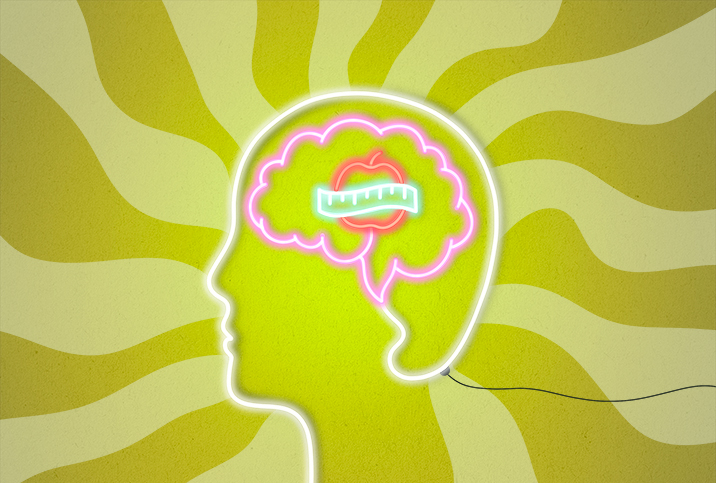How Eating Disorders Can Affect the Brain

The mention of eating disorders could conjure images of emaciation or even a seemingly too-ripped physique. But, as anyone who's battled an eating disorder knows, these illnesses are as much psychological as physical.
Eating disorders encompass several conditions, including anorexia nervosa, bulimia nervosa, orthorexia, binge eating disorder and avoidant restrictive food intake disorder. Contrary to stereotypes, they affect various demographics, encompassing all age groups, ethnicities, genders and backgrounds.
While different disorders have specific effects, each can substantially impact a person's psychological wellbeing and self-perception. Some have even more extreme ramifications, including altered brain chemistry and structure.
What causes eating disorders?
No one is 100 percent certain why people develop eating disorders, though it appears a combination of factors like genetics, environment, social pressures and emotional stability could contribute.
"People with eating disorders typically report having a desire to be thinner or to look better to improve self-esteem, but this desire can quickly grow into a paranoid obsession," said Jamie Hickey, NASM, FMS certified trainer, registered dietician and founder of Truism Fitness.
While a desire to "improve" the physical form is undoubtedly a common motivation, many people with eating disorders begin restrictive eating as a means of control in otherwise chaotic or stressful circumstances. For those with conditions like binge eating disorder or bulimia nervosa, food might provide a dopamine rush and, if only briefly, a source of comfort or joy.
"It is important to remember that the true cause and driving factor of eating disorders is not food, but an underlying emotional issue," said Alexander Lapa, a psychiatrist at Asana Lodge.
Many, but not all, people with eating disorders have co-occurring mental illnesses. However, it's not always clear if these are the cause or effects of the condition.
"Eating disorders are generally associated with other mental health conditions including depression, anxiety, obsessive-compulsive disorder, PTSD and borderline personality disorder," said Lindsay Wengler, M.S., R.D., CDN, CNSC, owner of Olive Branch Nutrition. "The changes to brain function associated with eating disorders can further exacerbate these conditions, prompting eating disorders to have the highest mortality rate of any mental illness, confirming how crucial recovery is."
People with eating disorders tend to have subtle but impactful neurological differences, including an altered reward response and serotonin pathways.
"In most cases, they have an insufficient amount of the three major neurotransmitters involved in appetite regulation—serotonin, dopamine and noradrenaline—which is why they turn to food for comfort," Hickey said. "This is why addressing emotional symptoms are equally important as physical ones."
Jillian Walsh, R.D., RP(Q), founder of Change Creates Change Eating Disorder Care, pointed to some evidence of a correlation between insula size and eating disorders, though more research is necessary. The insula is a region of the brain that provides emotional cognition to physiological experiences.
"For those with anorexia nervosa, the right insula, which affects taste perception and self-recognition, may contribute to thoughts or fears of being fat while in actuality [they are] severely underweight," Walsh said. "For those with bulimia nervosa, the left insula may interfere with fullness cues and the reward-responsiveness in individuals with bulimia nervosa is reduced."
People who experience eating disorders may suffer from body dysmorphia, where they obsess over perceived flaws in their physical appearance. Dysmorphia often involves an incorrect perception that one is overweight, which leads to food restrictions or purging behaviors.
What are the cognitive and psychological effects?
Hickey described the long-term consequences of eating disorders and nutrient deprivation as significant, though not well-understood.
"Chronic food deprivation can cause depression, along with serious disruptions in memory and other brain function," Hickey said. "The nutritional deficiencies that result from starving oneself or being forced to vomit up what one does eat also slows growth and impairs mood, makes it difficult to think clearly, disrupts menstrual cycles in women and sperm production in men, and lowers levels of serotonin—the feel-good neurotransmitter."
The Minnesota Starvation Experiment, an oft-cited study by Ancel Keys—renowned American psychologist who studied the influence of diet on mental health—demonstrated the various effects of prolonged nutrient deficiency, including cognitive, emotional and physiological impairments, such as fatigue, obsessive thoughts, depression, apathy, and decreased cognitive testing and ability.
"Emotional and cognitive changes are very common with an increase in mood swings, decreased motivation, concentration, and memory issues. Depression and anxiety will also increase," Lapa said. "With these symptoms increasing, more often than not, the person struggling will lean further into their eating disorder as it will feel like a controllable factor in their lives, creating a vicious cycle."
'Chronic food deprivation can cause depression, along with serious disruptions in memory and other brain function.'
Wengler noted prolonged starvation can change the brain's structure as well, decreasing its volume and deteriorating white and gray matter.
"White brain matter has been seen to return to healthy levels with recovery. However, loss of gray brain matter can persist," Wengler said. "Loss of gray matter has been associated with increased risk of depression, schizophrenia and addiction."
"One area of the brain severely impacted by chronic malnutrition is the hippocampus," Hickey said.
The hippocampus plays a significant role in learning, memory storage, spatial navigation, emotional regulation and stress response.
"Research on rats has shown food restriction leads to decreased functioning of the hippocampus, which causes an increase of hippocampal neuron density," Hickey said.
Food restriction has a "domino effect" on other parts of the brain, too, according to Hickey, including influencing appetite-regulating hormones (leptin) and thyroid hormones.
"Eating disorders can affect dopamine levels and the reward response system, too," Hickey added. "With bulimia and binge eating, over time, the food-induced dopamine rush dissipates. Eventually, this can cause a down-regulation in dopamine levels in the brain, leading to depressive symptoms."
Feeding your emotions
However, for people with restrictive eating disorders, the act of eating may elicit a different kind of emotional response.
"For most people, positive endorphins and feelings are released when we eat food. This is linked back to our primitive and our natural survival instinct," Lapa said. "But for a person with an [restrictive] eating disorder, when they eat, anxiety and negative feelings ris, reinforcing [the idea] that not eating will reduce these feelings, pushing them further into their disorder."
The short-term effects often dissipate when a person recovers, but long-term consequences can vary dramatically.
"Psychological issues can persist long after receiving treatment," Lapa said. "Many that have had a severe eating disorder will admit that all the negative feelings never fully leave, but they learn how to manage the internal battle they face with their eating disorder."
"It takes a long time to bring back the strength in muscles that have been lost because of malnutrition and starvation. Some people may have difficulty with memory or mental function, which is exacerbated by anorexia nervosa," Hickey explained. "And chronic self-starvation can cause degenerative changes that are irreversible, including osteoporosis and heart disease."
'Eating disorders not only have lasting effects on their sufferer's body but also their thoughts or feelings about themselves long after the physical effects have been taken care of.'
Emotional and social impacts may be more severe for those who develop eating disorders before or during puberty because malnourishment can impede growth and development, Lapa said.
Along with the age of onset, eating disorder duration is another "strong predictor" of the severity of symptoms or likelihood of relapse, Hickey said. "The longer the duration of the disorder—even up to 20 years—even without episodes of active illness—increases the likelihood of more serious outcomes like depression and poor quality-of-life scores."
"Eating disorders not only have lasting effects on their sufferer's body but also their thoughts or feelings about themselves long after the physical effects have been taken care of," he explained. "This is why there is such a high relapse issue in people with eating disorders decades after rehabilitation.
"It is important to note that all eating disorders are serious mental illnesses with medical complications," Hickey added.
How to get help
Eating disorders can cause or compound physical ailments, too, including bone density loss, cardiovascular difficulties, infertility, multi-organ failure and brain damage, which lend to the high mortality rate. For this reason, it's crucial to seek specialized care to tend to both psychological and physical complications.
"Decreased intake of vitamins, minerals and macronutrients either from restriction, binge eating or purging can affect the most basic and complex bodily and brain functions," Wengler said.
"There are a number of ways to mitigate the long-term effects of eating disorders and malnutrition. One way is to work with a nutritionist. Another is simply by nourishing [your] body and mind thoroughly and treating oneself gently, as needed," Hickey explained. "It's also important to reconnect with one's own grief or shame around issues that may have contributed to the eating disorder in the first place such as traumas, neglect, bullying, etc."
Hickey noted that addressing the root of the eating disorder and the feelings of fear, shame or guilt that can accompany such illnesses can make a recovery, "move along more purposefully." Doing so can help people better manage negative thought patterns to escape the vicious cycle eating disorders can perpetuate.
According to Lapa, therapies like cognitive behavioral therapy (CBT), dialectical behavioral therapy (DBT), art or music therapy, family therapies or exposure therapy may help address contributing psychological factors.
"Although not all the psychological issues can be completely removed, the majority of people can learn very beneficial ways of managing and reducing the power the negative thoughts and feelings have," Lapa concluded.




















